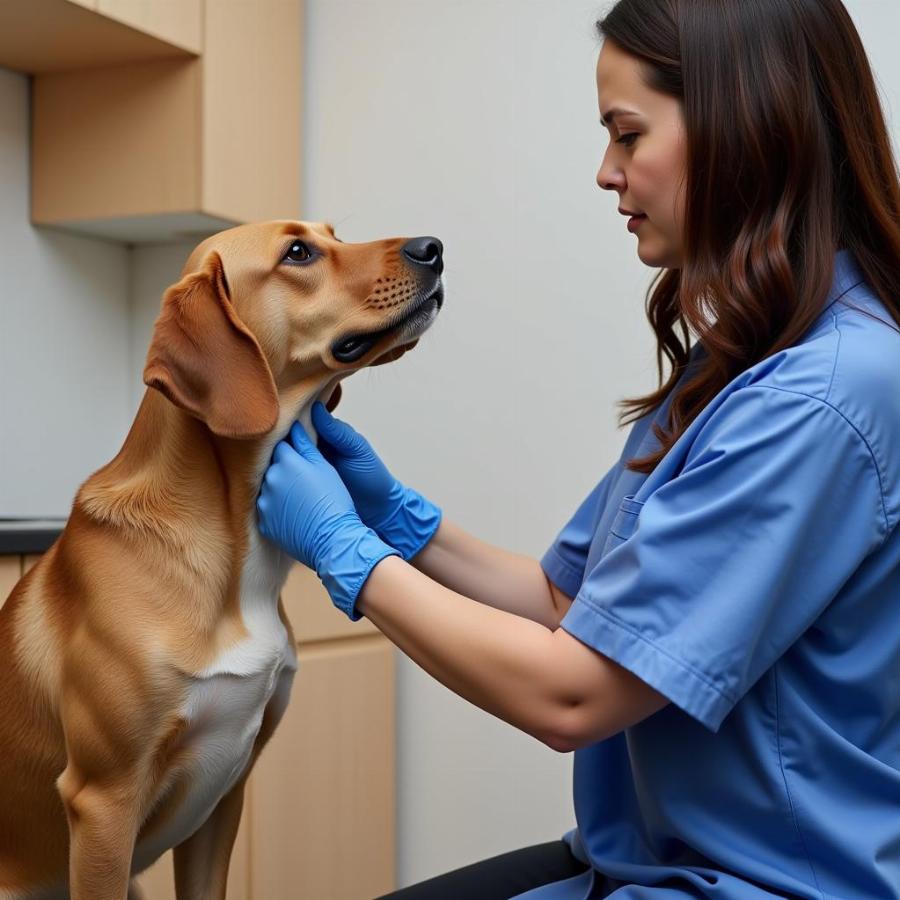Food coloring often adds a vibrant touch to human treats, but can it cause skin irritation in our canine companions? This is a common concern among dog owners, and we’ll delve into the details to provide you with a comprehensive understanding of how food coloring might affect your dog’s skin. We’ll cover potential risks, symptoms to watch for, and tips to keep your furry friend happy and healthy.
Understanding the Potential Effects of Food Coloring on Dogs
While not all dogs are sensitive to food coloring, some can experience adverse reactions, particularly with artificial colors. These synthetic dyes, often found in commercial dog treats and even some human foods dogs may sneak a bite of, can trigger allergic reactions or sensitivities in susceptible dogs. The most common reaction is skin irritation, which can manifest in various ways.
Some dogs might develop localized redness, itching, or hives where the dye has come into contact with their skin. Other dogs may experience more generalized itching and discomfort across their body. In rare cases, more severe reactions like facial swelling or difficulty breathing can occur. If you notice any of these symptoms after your dog has ingested something containing food coloring, contact your veterinarian immediately.
Identifying Food Coloring in Dog Treats and Food
Knowing what to look for on ingredient labels is crucial. Artificial colors are usually listed by their FD&C numbers, such as FD&C Red No. 40 or FD&C Blue No. 1. While these are generally considered safe for humans in regulated amounts, dogs can have different sensitivities. Natural food colorings derived from fruits and vegetables are generally considered safer alternatives.
“Choosing treats and foods with natural colorings is a proactive step towards minimizing potential skin issues in your dog,” says Dr. Amelia Shepherd, DVM, a veterinary dermatologist with over 15 years of experience.
Natural vs. Artificial Food Coloring for Dogs
Natural food colorings, like beet juice or turmeric, are less likely to cause skin problems in dogs. However, even natural ingredients can sometimes cause sensitivities in individual animals. It’s always best to introduce new foods and treats gradually and observe your dog for any adverse reactions.
What To Do If Your Dog Has a Reaction to Food Coloring
If you suspect your dog has a skin reaction to food coloring, the first step is to remove the suspected source from their diet. Consult your veterinarian for a proper diagnosis and treatment plan. They may recommend antihistamines, topical creams, or other medications to alleviate the symptoms.
Preventing Skin Irritation from Food Coloring
The best way to prevent skin irritation from food coloring is to choose treats and foods made with natural ingredients and avoid those containing artificial colors. Look for treats that specifically state they are free of artificial colors and flavors.
“Prevention is always better than cure,” advises Dr. Robert Chase, DVM, a leading expert in canine allergies. “Careful selection of your dog’s diet can play a significant role in maintaining their overall health and well-being.”
Conclusion
While food coloring, particularly the artificial kind, can irritate some dogs’ skin, it’s not a universal problem. By being mindful of the ingredients in your dog’s food and treats, you can minimize the risk of adverse reactions. Choosing natural options and monitoring your dog for any signs of sensitivity are key to keeping their skin healthy and itch-free. Always consult with your veterinarian if you have any concerns about your dog’s skin or overall health. Does food coloring irritate dogs skin? It certainly can in some cases, so being proactive is essential.
FAQ
-
What are the signs of food coloring allergy in dogs? Common signs include itching, redness, hives, and in rare cases, facial swelling or difficulty breathing.
-
Are all food colorings bad for dogs? Natural food colorings are generally considered safer than artificial ones.
-
How can I prevent my dog from reacting to food coloring? Choose treats and foods with natural ingredients and avoid those containing artificial colors.
-
What should I do if my dog has a reaction to food coloring? Remove the suspected source and consult your veterinarian.
-
Can food coloring cause anything other than skin irritation in dogs? In some cases, it can trigger digestive upset.
-
Are there any specific breeds more prone to food coloring allergies? While not breed-specific, any dog can develop a sensitivity.
-
Can I give my dog human food with food coloring? It’s best to avoid it as the concentration of artificial colors may be higher than in dog-specific products.
 Veterinarian Examining Dog's Skin
Veterinarian Examining Dog's Skin
Explore More on Beaut Dogs
- Learn more about dog allergies: [Link to a relevant article on dog allergies]
- Discover healthy treat recipes for your dog: [Link to a relevant article on homemade dog treats]
- Find out more about dog skin care: [Link to a relevant article on dog skin care]
Beaut Dogs is your trusted source for all things dog-related. We provide expert advice and valuable resources to help you understand and care for your canine companion. For personalized guidance and support, contact us at Email: [email protected]. We’re here to help you navigate the wonderful world of dog ownership!